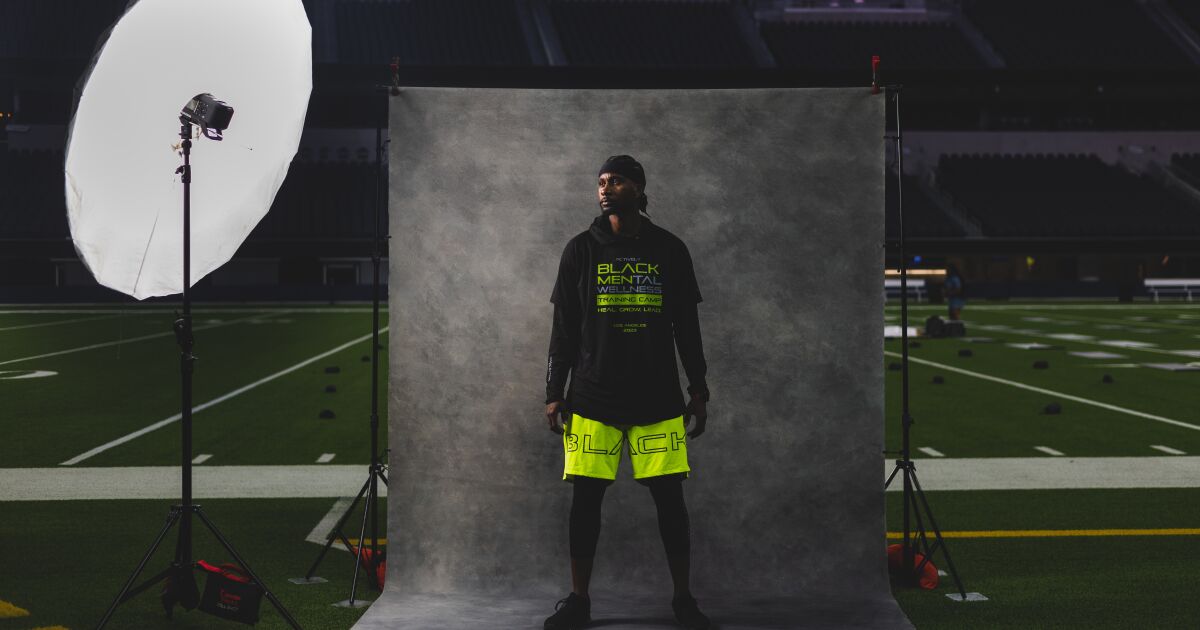
A new generation of Black athletes are reshaping the discourse on mental health. They are embracing a holistic approach to their training, not only emphasizing the physical strength of their bodies but also the health of their minds and spirits.
Prominent athletes such as NBA player DeMar DeRozan , tennis star Naomi Osaka, and Olympic medalist Simone Biles have spoken openly their mental health. Even superstar Serena Williams revealed in 2011 that she experienced depression after losing Wimbledon.
Former NBA player Lanny Smith is part of a wave of Black athletes taking the lead in dismantling the stigma surrounding mental health. In November 2020, Smith launched Actively Black, a premium athleisure and sports apparel brand aimed at reinvesting in Black communities while also enhancing their physical and mental health.
During Mental Health Awareness Month, Actively Black held their second annual Mental Wellness Training Camp for Black Men at Sofi Stadium. More than 100 Black men took part in meditation, sound healing and yoga. At this event, a wide panel of thought leaders in wellness, discussed their shared mission to impact the collective well-being of Black men.
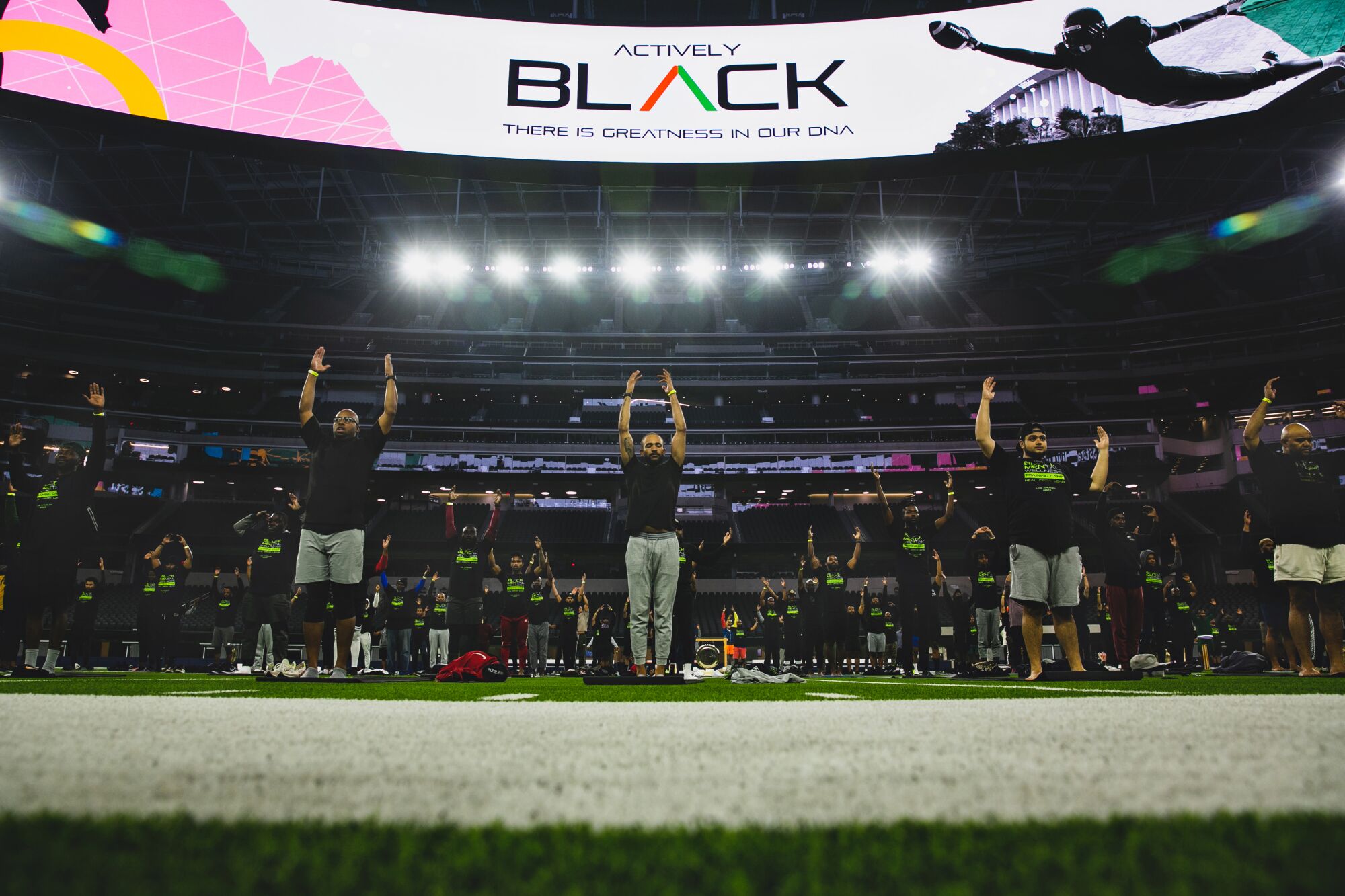
During Mental Health Awareness Month, over one hundred Black men took part in a sound bath at Actively Black’s Mental Wellness Training Camp for Black men at Sofi Stadium in Inglewood.
(Jason Armond / Los Angeles Times)
In a recent conversation, Smith reflected on the transformative power of art, the positivity arising from pain and creating something meaningful during difficult times that has the potential to inspire and uplift others.
Can you tell me about yourself and your organization?
I’m a former athlete who grew up playing basketball, with the dream of making it to the NBA. I was blessed to be a top 100-ranked player since the sixth grade. I was on elite-level AAU [Amateur Athletic Union] teams traveling across the country, playing against the best of the best. LeBron James and Chris Paul are the guys I played against growing up. That dream of playing in the NBA wasn’t something that was far-fetched. I played my college ball at the University of Houston, and then I signed my first NBA contract with the Sacramento Kings in 2009. Thirty-three days after signing my first contract, a big 6-10, 250-pound teammate fell into my left knee and tore the cartilage. I had two microfracture surgeries, and my NBA career was over just like that. I had an incredible opportunity to actually make it to my dream, a dream that I had since I was 5 years old, and then it was done in 33 days. It was devastating.
How did obtaining your lifelong dream and losing it quickly affect your life?
I went through depression. I didn’t see myself doing anything else other than playing in the NBA. I had this fear of, “What am I gonna do with the rest of my life?” I remember wanting to just stay at home in my room. I didn’t want to go out in my own city because any time somebody saw me, they would say, “Hey, aren’t you supposed to be in the NBA?” or “I thought you were playing basketball.” It was a constant reminder of this heartbreaking thing. I started drinking heavily. I was really struggling with the fact that my dream was gone.
I didn’t seek help. I wish I did. Part of that also is probably a combination of ego and pride that you have as an athlete. There’s only 400 jobs in the NBA, and there’s millions of people trying to get there. I went from literally being with the best athletes in the entire world to back at home living with my mother. The depression also came from the fear of the future. What was I gonna do next with my life? I dedicated my whole life to make it to the NBA. That was my dream. That was my plan, A, B and C.
What helped you overcome your depression?
My mother raised me in the church. My mother raised me to make sure my faith was a central part of my life. I leaned on this the most during that time. My prayers, my faith and God’s grace helped me to come out of depression. I transferred all of my passion, my work ethic, and everything that I did to become the best basketball player that I could. I just transferred that energy into building Active Faith, and it saved my life.”
I launched my first brand called Active Faith in 2011. My business partners in that brand are Anthony Toler and Stephen Curry. It’s a faith-based sports apparel brand. It has grown to having customers in 75 different countries, we have done over $20 million in sales and have an incredible impact on the faith-based community.
Helping others also gave me purpose and meaning. The NBA had me speak to players and teams about my transition into life after basketball. A lot of guys struggle with an identity crisis related to who they are without this basketball. What do I do for the rest of my life? I’ve been able to find success after the NBA. Being able to talk to guys and let them know there is hope on the other side of this — there is another life on the other side — this has been a blessing.
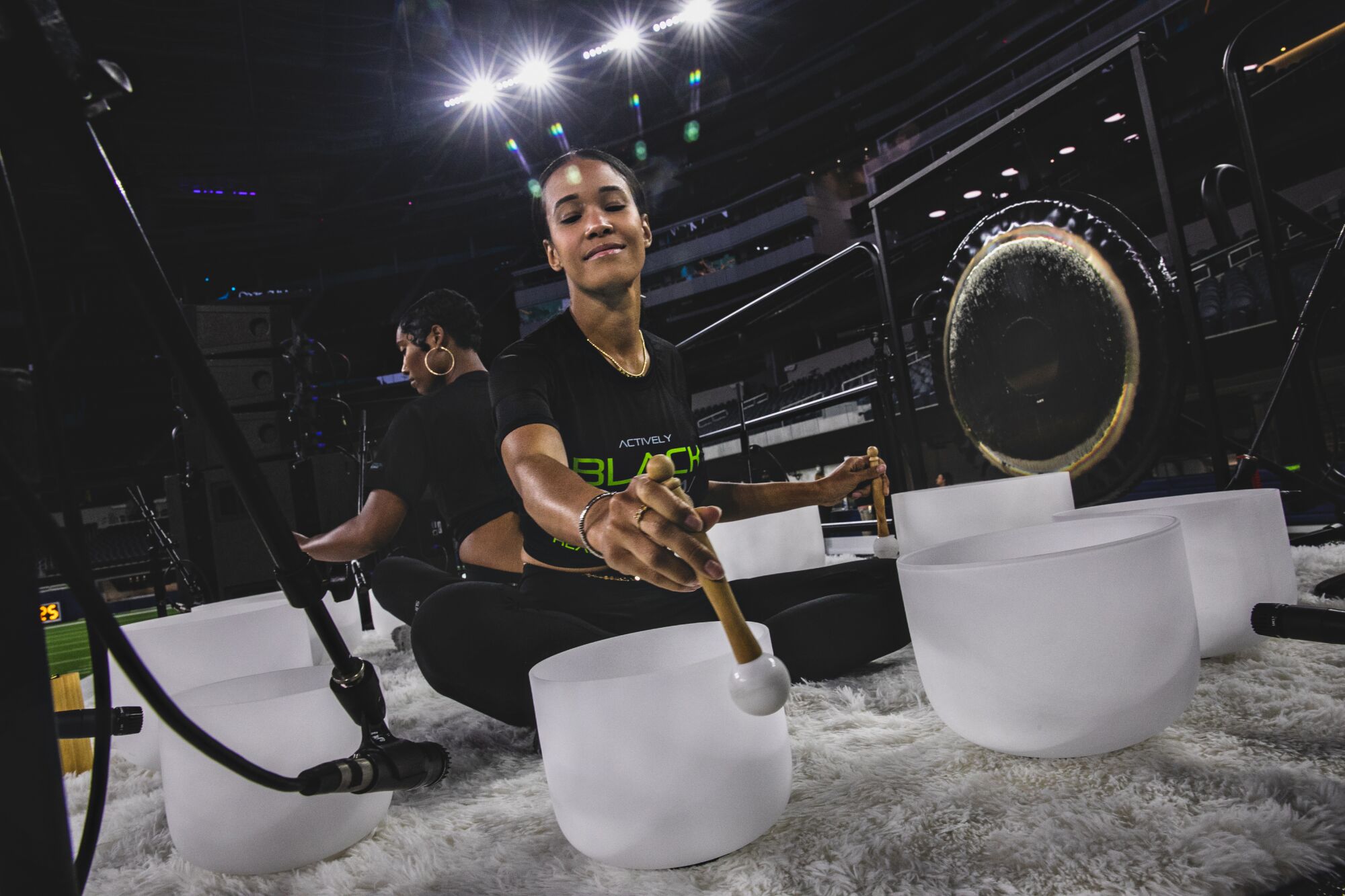
Sound bath healers play their bowls at Actively Black’s Mental Wellness Training Camp for Black men at Sofi Stadium.
(Jason Armond / Los Angeles Times)
How did NBA Champion Steph Curry become a partner in Active Faith?
The basketball world is small, it’s like a fraternity. Being a former player gave me some credibility. So when Steph and others were told about what I was building with Active Faith, being they were faith-based guys, they immediately wanted to be a part of it. Steph doesn’t play a game without wearing his Active Faith wristband.
What struggles did you face when launching your first business?
I had some identity issues. I was hiding myself from the Active Faith community. I had built this multimillion-dollar brand out of my mom’s home. But I was afraid that if the consumer base knew that it was this young Black male who actually owned the brand, that it would have a negative effect on the business. My personal Instagram was private at the time. You couldn’t find my name or my picture on the website or on the social media for Active Faith.
I had these different incidents where I was doing customer service, and a customer called and said that I sounded like I was Black. I said, “Well, I am Black.” And they immediately asked for a refund. I had an instance where there was a person interested in investing in Active Faith. We were going back and forth over email. When I walked in for an in-person meeting, I could see it on their faces. They were shocked that it was this Black guy that was behind the brand, and all of a sudden, they weren’t interested in investing anymore.
It was a struggle. My parents raised me to be proud of who I am, proud of my heritage, proud of being Black, and here I am, able to successfully transition from an NBA career that ended short to building a successful e-commerce brand, but I was hiding myself because I was Black.
How did you manage to come out of the shadows and embrace being a successful Black business owner?
After the murder of George Floyd and Breonna Taylor, I saw all of these brands come out with these declarations about what they were gonna do for the Black community. Suddenly every brand had some statement about it.
It felt very performative. It felt like it was just part of their new marketing strategy because outside of the pandemic, those issues with law enforcement, those issues with racism, those issues with police brutality had been happening in this country for decades, centuries, and Nike, and nobody else was saying anything about it. I knew these brands weren’t authentic. This is just another marketing strategy.
That’s what finally pushed me over the edge. It was time for me to stop asking for a seat at that table and to build my own table. So I launched Actively Black on Nov. 27, 2020.
What was your vision when you started Actively Black on your own?
The sports apparel industry is a multibillion-dollar industry that lacks Black ownership, but it has profited heavily off of Black talent, Black culture and Black consumerism.
Essentially my purpose was to create a brand that uplifts and reinvests into the Black community.”
It’s not just about the apparel, it’s not just about the product. It’s about the impact that we’re having on the community. I want this to be something that brings together the diaspora.
This isn’t just for Black Americans, this is for Black people all over the globe, and those that love and support us. I’ve got customers who are white, Asian, Hispanic; I’ve got customers of all different races and backgrounds who wear Actively Black and who support this mission and cause.
Can you share some of the success stories of your business?
There’s been a snowball effect from Day 1. We were the only Black-owned brand to present at the Winter Olympics, we outfitted Team Nigeria. For opening ceremony outfits, Actively Black was ranked No. 4 out of 85 countries. This was meaningful to me because it showed that this Black-owned brand, this small startup, could be on this global stage with all of the giants in the game.
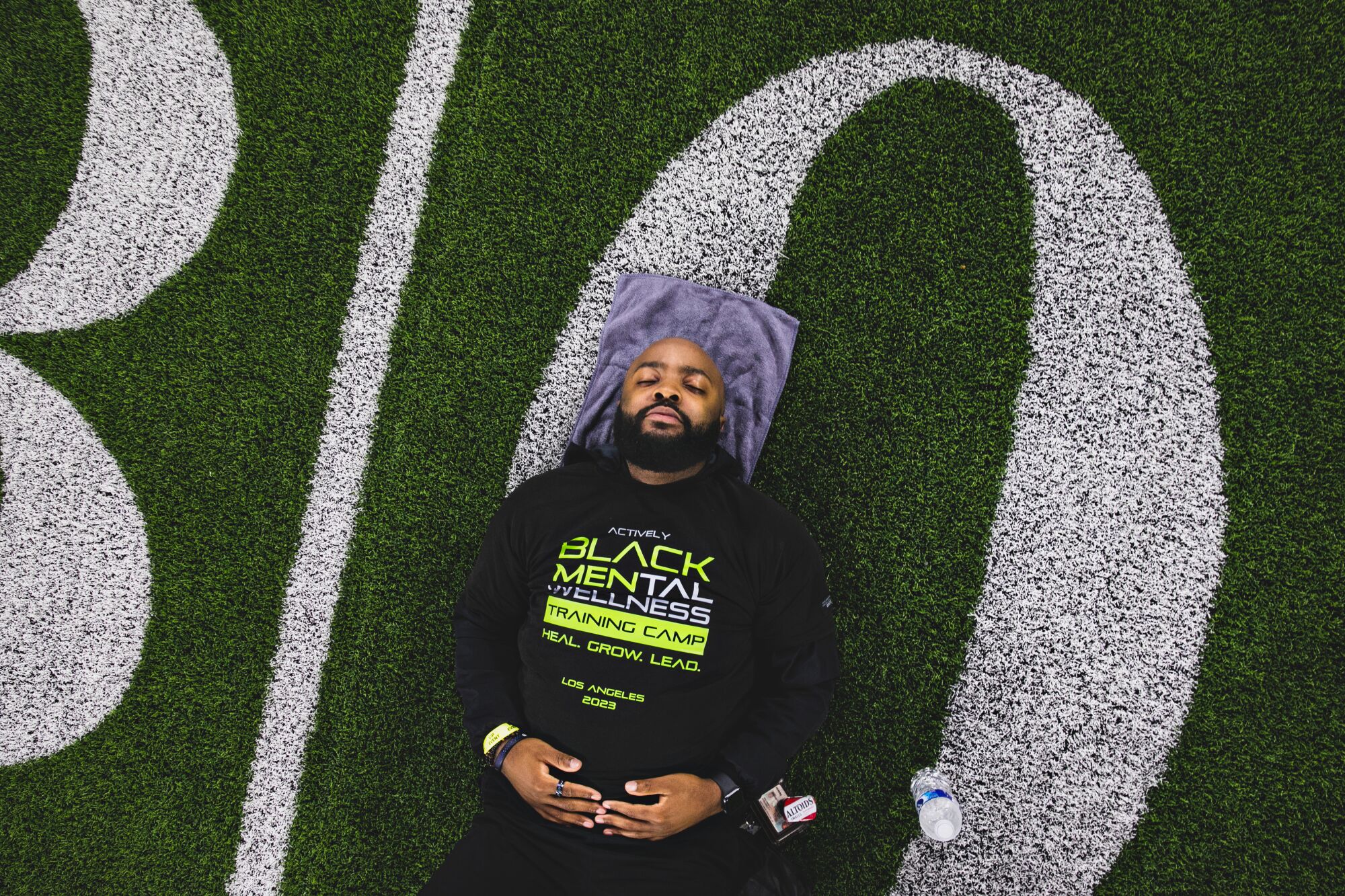
During Mental Health Awareness Month over one hundred Black men take part in a sound bath at Actively Black’s Mental Wellness Training Camp at Sofi Stadium.
(Jason Armond / Los Angeles Times)
Barack Obama wore our watch, and GQ picked up a story on that; those watches sold out in 48 hours. We collaborated with Marvel and Disney for “Wakanda Forever,” which was like a full-circle moment because the first Black Panther movie inspired me. We now have a collaboration with the Muhammad Ali estate that’s coming out soon.
Just seeing how the Black community has really rallied behind and supported this brand gives me a lot of fulfillment and pride. Knowing that we’re creating something that’s bigger than just another sports apparel brand. It’s not just another apparel brand, it’s actually impacting people’s lives.
Why did your brand want to shine a light on mental health and wellness?
I knew that this was gonna be a purpose-driven brand from the beginning. Mental health and specifically Black mental health is one of the things that is often overlooked, and it was something that I wanted to prioritize.
Our parents didn’t have access to therapists and mental health services. Nobody talked about mental health in the previous generations, so our people just had to deal with it. Think about how traumatic that’s been and how much of that trauma has just been passed down because nobody had an outlet to talk to somebody. This has led to generational trauma in the Black community.
People now recognize the negative effects of generational trauma and other issues that affect mental health. How can we completely overlook the fact that there’s a group of people who endured 400 years of slavery in this country, followed by Black codes and Reconstruction, followed with Jim Crow, followed with mass incarceration and COINTELPRO and the crack epidemic. There’s all of these things that have existed that have negatively affected the Black community.
I wanted to make sure that we talked about Black mental health so it doesn’t continue to carry the same taboo it once did.
How important is it to have a Black mental health provider, and how does Actively Black provide outreach to the Black community?
I think that it’s very important that we have access to Black therapists and other healthcare providers who understand from our perspective and experiences. I want to especially equip Black men with tools to help us. This is why Actively Black puts on a mental health event specifically for Black men. At Sofi Stadium, we do a yoga session, healing sound bath and meditation. We provide Black men with tools, resources and action items that they can take into their everyday lives, helping them deal with their pressure and stress.
We also amplify other Black people in this space who are helping the Black community with their mental health. Like my friend and former NFL player Ryan Mundy’s platform called Alchemy Health. It is one of the first mental health platforms that’s geared specifically to improving mental health in the Black community.
Did you face any hurdles when launching your second brand, Actively Black?
A lot of people told me that it wouldn’t work. I had Black people tell me that it wouldn’t work. I had Black people tell me that naming it Actively Black was gonna prevent it from being successful. It was gonna limit the number of people that I could service. People were gonna be afraid of that. I felt like all of that was just kind of the side effects of oppression, racism, discrimination. Some of our own beliefs are that if you are boldly and unapologetically Black, that it’s a negative thing. We’re fighting against those things and reclaiming being Black and what that means, and it is not a negative thing. We’re proud to wear that on our chest.
How important was the aesthetic of the brand, considering the diversity within the Black community?
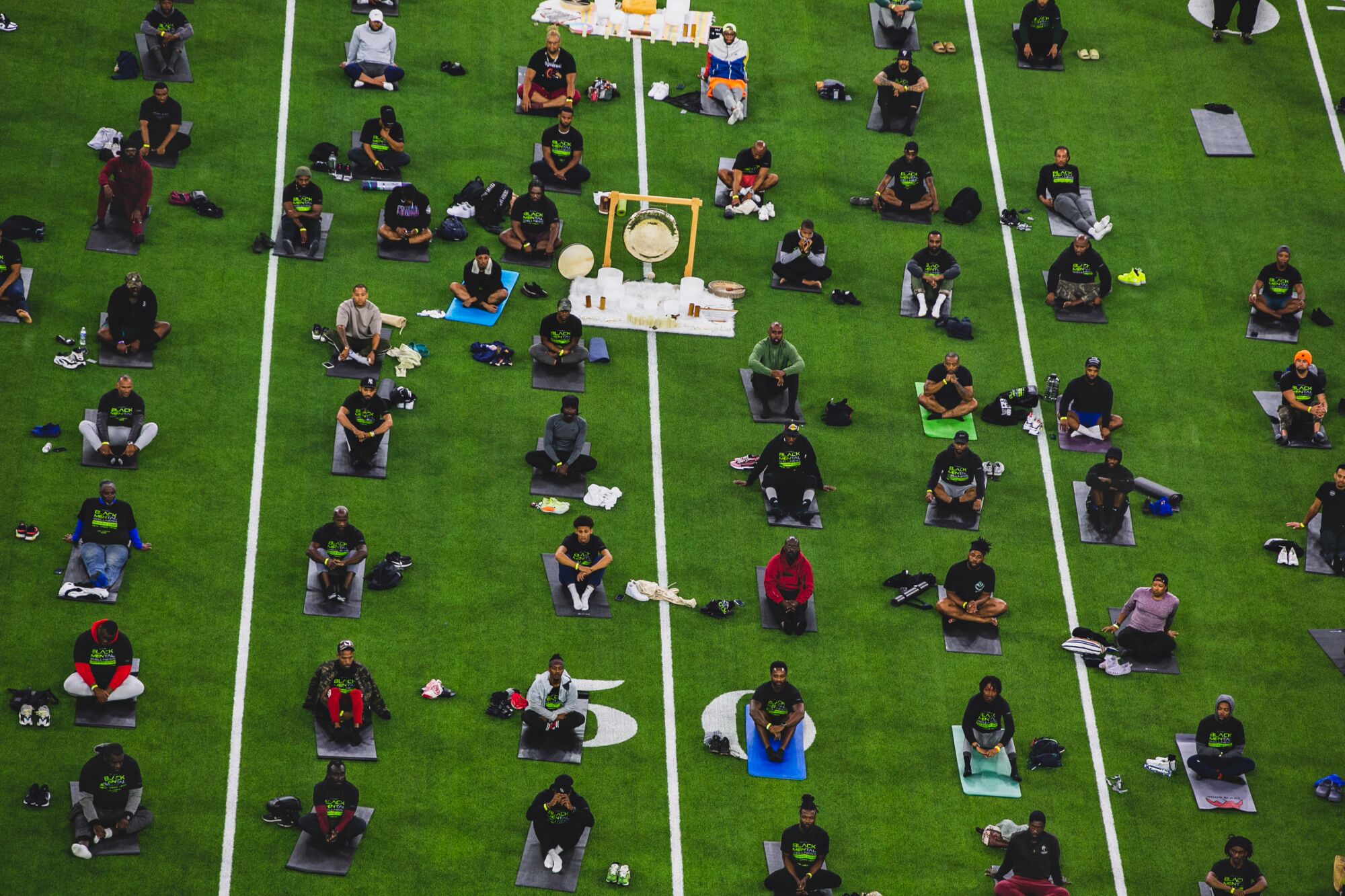
During Mental Health Awareness Month over one hundred Black men take part in a guided meditation at Actively Black’s Mental Wellness Training Camp at Sofi Stadium.
(Jason Armond / Los Angeles Times)
When I see the customers, fans and followers talk about seeing positive images of Blackness in our ads, seeing dark-skinned models being photographed beautifully, and what that has done to their self-confidence, I can’t tell you how much that means to me. Hearing people say, “I walked around with my chest poked out just a little bit higher when I had my Actively Black hoodie on.” This is what keeps me going. It provides so much fuel for me to keep working and keep building this thing.
We’re fighting against a stereotype that something that is Black-owned, it’s gonna be second-rate quality. I wanted people to not just buy Actively Black because it was Black-owned. I wanted this to stand up next to Nike, Lululemon or anybody else. I believe our people deserve something that is the best quality that can line up next to all these other brands.
There’s this added sense of pride that this is Black-owned. I didn’t have to sacrifice quality to represent something that’s Black-owned. I think that’s very important. I want Black people to feel excellent seeing something that represents them, and I want them to know that we can compete at the highest level. Being Black is not a barrier to doing that.












